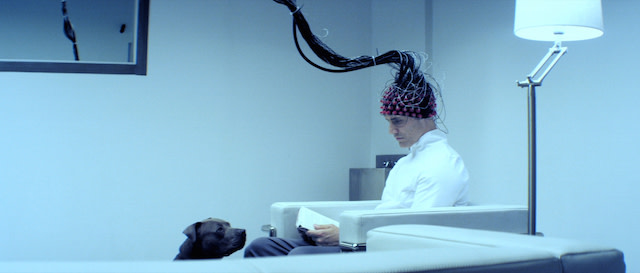A Fiendish Conversation with STIFF's Will Chase

Independent films like Listening are joined by less traditional arts experiences at this year's STIFF.
Image: Photo Courtesy STIFF

Will Chase
This year, STIFF pulled off an impressive feat: rebranding without losing its signature acronym. What was once the Seattle True Independent Film Festival morphed into the Seattle Transmedia and Independent Film Festival, expanding its reach beyond just the big screen and into new digital formats that are pushing the boundaries of how stories can be told (virtual reality, interactive applications, etc.). No matter the format, STIFF offers a platform for fresh and unusual narratives that one won't find anywhere else. The festival's new incarnation begins this Friday, May 1, and runs through May 9.
For our latest Fiendish Conversation, we talked to STIFF programming director Will Chase about what defines transmedia, festival highlights, and the relationship between STIFF and SIFF.
What led to STIFF shift—or change the T, I guess—from True to Transmedia?
The biggest impetus for us was that we wanted to kind of stay current with what was happening in the digital world right now. And to do that, you can't pigeonhole yourself into just being a film festival, because there's so many different ways that you can tell stories now. We visited a couple of other festivals and saw the success that they were having with these new platforms of storytelling, and we thought it was really cool and really current. So we felt like transmedia was just kind of a natural progression into that new realm of storytelling.
So what’s your go-to response when people—assumedly often—ask, “What is transmedia?”
We decided to kind of set our own definition and exactly what transmedia meant to STIFF. Over the course of the last year, we figured out that transmedia is telling a digital story across multiple platforms. For example, you have a computerized graphic novel, something that you would read online. And then you take that, and you make that graphic novel into a web series or a short film or a second screen application on your phone that works in conjunction with your PC or your Mac. So you have two different platforms by which you're telling either the same or multiple stories that all generally coincide or coalesce into the same story toward the finale.
So what are some of the specific transmedia offerings you’ll have at this year’s festival?
One of the projects that it is really exciting to me is called Assent. Basically it's an Oculus Rift-driven documentary film. So you wear Oculus Rift [virtual reality headset], and you experience what the actual storyteller is describing to you through the audio while seeing the world through the actual documentary film. It was a concept developed by a gentleman named Oscar Raby, and basically he took a story that his father had been telling him for the last 20 years and translated it into a completely immersive virtual reality experience. The story goes that his father was in the Chilean army back in the ‘70s during the revolution and he is called up this hill to witness a court martial. As soon as he gets to the top of the hill, he witnesses seven people executed. These seven people were innocents; they were like teachers and construction workers. Basically, they were sending a message. So this is a conversation that Oscar and his father had been having as to exactly how it affected his father's life over the last 20 years, and conversely how it has affected Oscar's life during that time. When you actually put the Oculist Rift on, you're in the world. [The graphics are a little angular], but it still has that chilling effect where you literally have to walk up the hill. There's really nowhere else to go. You walk up the hill and you experience this assassination. You see these people get murdered. When I first did it, I had a pretty visceral experience to it. I got goosebumps. I get goosebumps telling the story.
And all these transmedia experiences are housed in a single space, correct?
They will all be hosted in the STIFF Gallery, which is at 5000 University Way. We're going to have experimental films that'll be in our traditional theater spaces, but most of the other transmedia installations really are not appropriate for a theater setting. We did a Kickstarter, which we actually just successfully funded, so that we could keep the gallery free and open to the public from noon until 8pm every day of the festival.
Which films in this year’s STIFF lineup are you really excited about?
I'm really excited about is Witness Bahrain [screening May 7 & 8]. It's about the Arab Spring. A documentary filmmaker [Jen Marlowe] over there just happened to be in Bahrain when everything started happening—and there's no way she would've gotten into the country being a journalist, being a documentary filmmaker—she just had to be vacationing there during the time. So she got all this amazing footage of all the protests. Our first screening of it is already sold out and the second screening of it is well on its way to being sold out too.
Is there anything else you're looking forward to regarding this year's edition?
We're going to be doing some filmmaker forums and people can find out about that on our website. We'll be doing like a children's animation workshop with one of the gentleman who has an animated feature film in our festival called Bubble Bubble Meows and the Meteor Stomachache. We are going to have a gaming forum at the University District Library with a bunch of the DigiPen students called “So You Want to Be a Game Designer.” DigiPen is one of our sponsors this year, so naturally we asked if some of their students could come over and speak to the public about exactly what it is they do, what the process is about becoming a game designer. We have eight or ten different forums that we're going to do this year, and those will be between Scarecrow Video and the U-District Public Library.
What do you feel is the importance of STIFF to the Seattle arts and cultural community?
A lot of the programming that we do is programming that's very difficult, so to speak, for other festivals based on length, based on content. That tends to be our opportunity to show stories to people that you wouldn't normally see at any other film festival. And that's kind of our claim to fame: we're the ones that are no afraid to show this stuff that everyone else is afraid to show.
I mean, there’s the inevitable comparison to SIFF—since they both happen in May—where STIFF offers sort of the punk rock D.I.Y. ethos counter to SIFF’s red carpets.
For a long time we had this contentious relationship with SIFF, and that really no longer exists. We're all friends now. We know that we're not competing with one another; that's like David and Goliath. Why would we even try? I don't want us to come across as the festival that is in contention with SIFF, because we're not. [Laughs]
I think we are definitely a counter offer to what SIFF will program. Our programming is challenging, sure, but it's just as good as anything you're going to see at SIFF. Actually, to tell you the truth, a lot of what SIFF programs is stuff that we were going to program, but because of their policy of not being able to screen anything a certain amount of months prior to their festival, if say, a filmmaker submits to both STIFF and SIFF and they get into both, most people are going to go to the SIFF just because you have a much larger audience. And as a filmmaker myself, I completely understand that. Why wouldn't you? So there are situations where we have to have a conversation with them and be like, “Look this film is going to sell out for us. [Laughs] Honestly you guys will probably maybe put fifty butts in seats because of this, so why don't you just hand that one over to us?” Now, that doesn't happen very often, but yeah. [Laughs]
STIFF
May 1–9, Various venues, Free–$20




